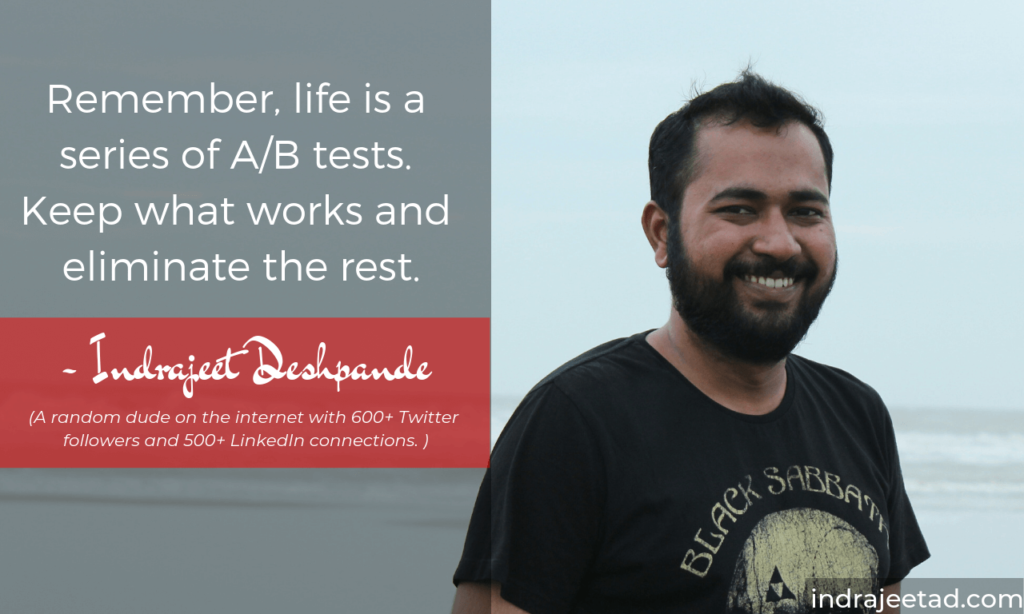Congratulations on taking the first steps towards making your life nothing but spectacular. You are capable of manifesting everything that your imagination can conjure up.
I could go on and on about promising all the great things that can happen to you, which you would anyway forget by the time you finish reading this article.
Honestly, I tricked you. You don’t have to read this article or most of the content on the interwebz to be successful, but since you’ve already clicked on the link, you might as well finish it.
The internet is one giant cesspool of ridiculously mediocre advice. Get up at 5:30 AM, workout, meditate, drink green tea, follow random life hacks, read 3087 books each year, and listen to ten podcasts a day, and you will miraculously become the next Elon Musk.
I’m pretty sure if I’d somehow reverse-engineered Elon Musk’s rules for success, I wouldn’t be wasting my time posting whiteboard animations on YouTube. I’d rather be planning to develop plush, lavish, imperial, majestic (Include adjectives that any real estate ad copywriter “employs”) residential properties on Mars.
Motivational speakers often speak about Jeff Bezos, Jack Ma, Mark Zuckerberg, and Elon Musk on how they built an empire out of nothing.
Mark Zuckerberg built Facebook in his Harvard dorm room. What’s your excuse?
As laudable as this feat of achievement is, very few of us bother to understand the whole picture. How many of us know that Mark’s elder sister Randi helped Mark grow Facebook with her market development expertise? (Oh, and btw, Randi Zuckerberg had already worked for two years in marketing for Ogilvy & Mather before joining Facebook.)
Of course, it takes self-discipline, hard work, tenacity, and bravado, among many other qualities to be successful, but they will not determine your success on their own, i.e., correlation does not imply causation.
Elon Musk isn’t successful because he gets up at 5 AM every day. He is successful because he’s a freaking genius who happens to wake up at 5 AM.
Elon Musk isn't successful because he gets up at 5 AM every day. He is successful because he's a freaking genius who happens to wake up at 5 AM. Share on XMotivational content gives us a quick dopamine rush, which makes us feel good. We are determined to achieve great things until the rush wears out.
We get these short bursts of motivation because we see a skewed interpretation of reality. While the advice ‘Never give up‘ or ‘Winners never quit. Quitters never win‘ incites us to set audacious goals in life, it rarely works in the long run because the advice is vague.
We all are gullible. We’re always looking for band-aid solutions. Quick fixes. Random lifehack articles give us that. Remember, they’re called hacks for a reason. They also kinda numb our guilt of inaction. “Reading such articles is an attempt of improving myself even though I may be doing nothing to improve myself.“
And then there are self-help books on success, positive psychology, the law of attraction (LoA) or just about anything overly sanctimonious or optimistic.
George Carlin sums up the bs related to self-help books perfectly,
“If you’re looking for self-help, why would you read a book, written by somebody else? That’s not self-help, that’s help! There’s no such thing as self-help. If you did it yourself, you didn’t need help. You did it yourself!”
– George Carlin
(Note: I have nothing against evidence-based positive psychology. What I object is, making some stuff up to prove a point. I have often noticed pseudo-psychological and pseudo-intellectual hooey relying a lot on metaphors, quotes, or any subjective content as a retort to “debunk” evidence-based outcomes.
While such comebacks fetch laughs, claps or general nods of approval during the moment, a little strain on your brain can immediately call-out the logical fallacies.)
Nothing guarantees success. Sure, having a well-planned morning routine will help you stay healthy, but still, it doesn’t ensure that you’ll wake up as Elon Musk someday. Just look at people who have figured this stuff out, and none of them is near to the success of Elon Musk, Jeff Bezos, or Bill Gates.
So, the next time you’re compelled to consume more motivational content or feel that your judgments are clouding your thinking, I’d urge you to remind yourself do the following things:
Table of Contents
1. Challenge Your Confirmation Bias
Confirmation bias makes you look at things that conform to your existing beliefs. When you are planning to buy a new car, wherever you look, you see the car you want to buy. When you start noticing such patterns, the granddaddy of the proponents of bullshit known as the law of attraction says, “You’re attracting things in your life that are coherent with your thoughts.”
In fact, you’re choosing to see things that resonate with your predominant thoughts. So, next time when you see 11:11 in your clock, it will dawn on you that those angels are not with you, it’s just your confirmation bias.
To tackle this, challenge yourself by finding a piece of evidence that is contrary to your beliefs. For example, if you’re searching for “Why should I buy X,” alternatively search, “Why I should not buy X.” This will equip you with enough data to help you make a rational decision.
2. Be Wary of the Survivorship Bias
Such hard work. Much success. Wow!
We admire the outliers, people who deserve a hero’s welcome. The ones who persevered despite hardships and failures and rose to stardom.
Self-help and motivational literature banks on such success stories. They romanticize people who failed miserably for ages until they suddenly hit the jackpot one day and walked into richness.
These examples work because we see hope in them. That’s why we support the underdogs. But these examples show a partial side of truth. Not all those who persevered became successful. Some fell into an abyss to never make a comeback.
Survival/survivorship bias forces us to look only at the positives, and this is not a good thinking strategy because we lose rationality when the bias kicks in.
The LoA talks a lot about how many people have reversed life-threatening diseases or manifested wealth by doing a specific set of activities. But if I were successful in cracking the secret (See what I did there!) of the LoA that promises me unlimited things and experiences, I definitely wouldn’t choose to be this half-brained nitwit who in spite of being an authority on the topic of the LoA, manifested a negligent homicide and a two-year prison sentence.
To overcome the survivorship bias, look at things, circumstances, incidents, and stories in their entirety. Many times luck plays a huge role in success, and people disregard it entirely and attribute it to grit.
Also, as discussed earlier, avoid falling into the trap of following generalized advice. You know, stuff like productivity hacks, tactics, or quick fixes. Remember, life is a series of A/B tests. Keep what works and eliminate the rest.

I would strongly recommend the following two resources to learn more about cognitive biases:
- 4 Cognitive Biases You Should Be Aware Of
- 8 Powerful Ways To Overcome Thinking Errors And Cognitive Biases
3. Steer Away from the Herd Mentality
We, humans like to conform to the rules of the tribe we live in. It’s a primal trait because not following the rules could get you kicked out of tribe during the hunter-gatherer age.
The modern-day example of this is a concept known as social proof. How many times have you liked a Facebook page because a friend was already following it or bought a product because an influencer was using it?
People prefer relying on peers, friends, family members or celebrities rather than relying on brands, and although there’s nothing inherently wrong with relying on people you trust, ensure that you’re being rational in decision making than being emotional.
To avoid being tricked by the herd mentality, learn to identify artificial affirmations. That means, distinguish between legit testimonials and manufactured ones. Being aware of when your cognitive and survivorship biases kick in can help you do away with your emotional decisions.
4. More Information != More Wisdom
Just like the biases/mistakes mentioned above, I’ve also been guilty of the assumption that consuming more information will make me better at the craft I’m learning. I’ve read plenty of music theory books and biographies of famous musicians, yet I remain a bedroom guitarist trying to learn all seven positions of the three-notes per string major scale.
Learning to swim is more valuable than reading tonnes of books on how to swim. And this premise applies to any skill or discipline you can think of. Today, we have practically endless avenues to study whatever we want, and if we’re not mindful of the knowledge we consume, we will end up overwhelming ourselves which will eventually lead to the dreaded information overload.
(And since we’re talking about being deliberate in the information we consume, here is a shameless plug that explains why you should read fewer business books.)
The wise thing to do here is to let go of the excessive snacking culture that gives us fleeting moments of instant gratification and focus on acquiring wisdom that is worthy of something.
I’m glad if you’ve read this far. I’ve been wanting to write this article for ages as a reminder for myself and share whatever I’ve learned along the way with my regular readers (i.e., my six email newsletter subscribers.)
Image Credits: Marvin Meyer

Damn Indrajeet, this is really really good stuff. Would love to read more (isn’t that ironic, given the later part of this blog post).
Needless to say, love your sense of humour.
Keep it up. 👌👍
Haha. Glad you liked the article, Mihir!
Nice article Indrajeet. Subscribing for more.
Thanks a lot, Sushil!
There are a lot of things here that I agree on and a lot I disagree with. But what you’ve detailed here is similar to the ‘intelligent follower vs the over enthusiastic leader’ fallacy. Also, motivational content is in a way, like it’s own religion. It doesn’t need to be logical. It simply needs to provide a little hope to someone in the dark. People follow it because they receive a little faith. But like you’ve rightly pointed out, faith alone can’t make a saint. All in all it was a good read that I’m glad I stumbled across.
Hi RK, thanks for sharing your views. I completely agree with motivational content being like a religion in itself.
My argument is, motivation on its own can’t move mountains or help someone get off the couch and go for a walk.
In my experience, motivational content has been addictive. The more I read, the more I wanted to read in the quest of finding the best/most optimal thing. But it doesn’t work like that.
Wow, that was great reading. I have had varied success with the LOA, however I am well aware of the so-called ‘Gurus’ trying to sell the latest book or whatever. I always think if they have successfully used the LOA to manifest their dream life, why are they trying to make even more money trying to sell their book ?? Doesn’t add up. Anyway, great article.
Glad you liked the article, Garry! You can’t call it a law if the results are subjective, right? Go ahead, recommend the practices to improve the quality of life, but don’t sell it as an objective rule that guarantees results.
Nice one ID. As long as there’s money in the market, and a populace that will even read at least 5 reviews of shoe laces before buying them, there will be a booming market for such “motivational”, “inspirational” speakers.